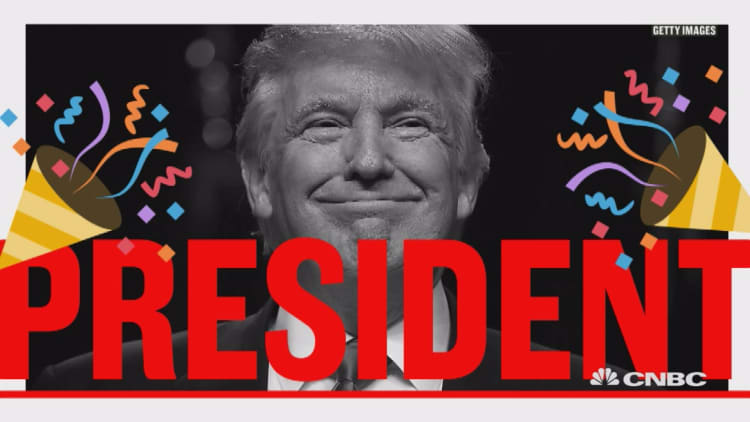
Analysts weighed in on what a Donald Trump presidency may mean for the U.S. economy in the hours following his decisive victory.
Trump's victory signals that "America demands stronger economic growth" as "growth lifts and unites the country and perhaps defines the national psyche," Deutsche Bank said in a research note. With the GOP maintaining its hold on both houses of Congress, Bank of America Merrill Lynch said the increased chances of tax cuts and stimulus could lead to stronger growth and higher rates.
Despite market jitters about a Trump presidency, BMO Capital Markets pointed out in a research note that many of the president-elect's campaign promises will need approval from a "skeptical Congress." Bank of America Merrill Lynch said, however, that Trump's pledges for "the replacement of the Affordable Care Act and further restrictions on immigration" would likely benefit from the Republican Congress.
Tax cuts
If Trump holds to his promise of slashing corporate tax rates, Jefferies said that this could be good news for consumption as "tax cuts get spent!" But Bank of America Merill Lynch argued that these tax cuts would "favor domestic companies over multinationals, though the latter could see a one-time benefit from repatriation of cash held overseas."
Trade
As Morgan Stanley said in a research note, "Trade policy is an area where a president has the potential to unilaterally create transformative change, at least in the short term." The firm cautioned though that Trump's "attempts to protect US manufacturers through renegotiating free-trade agreements may backfire, by hampering global supply chains and export markets."
Jefferies also said a "more interventionist policy towards trade ought to help domestic intermediate producers." The firm said that it likes the materials sector for this reason. But these "international trade wars" may lead to "higher inflation, more uncertainty, reducing consumer spending and eroding business confidence vital for boosting business investment," Citi said in a research note.
HSBC said in a research note that a "less open US trade regime could potentially harm the US economy and damage export and GDP growth in its trading partners, particularly in Mexico and China." The firm added that "depending on the specific measures, retaliatory action from elsewhere could be expected while the risk of trade and currency wars could grow."


